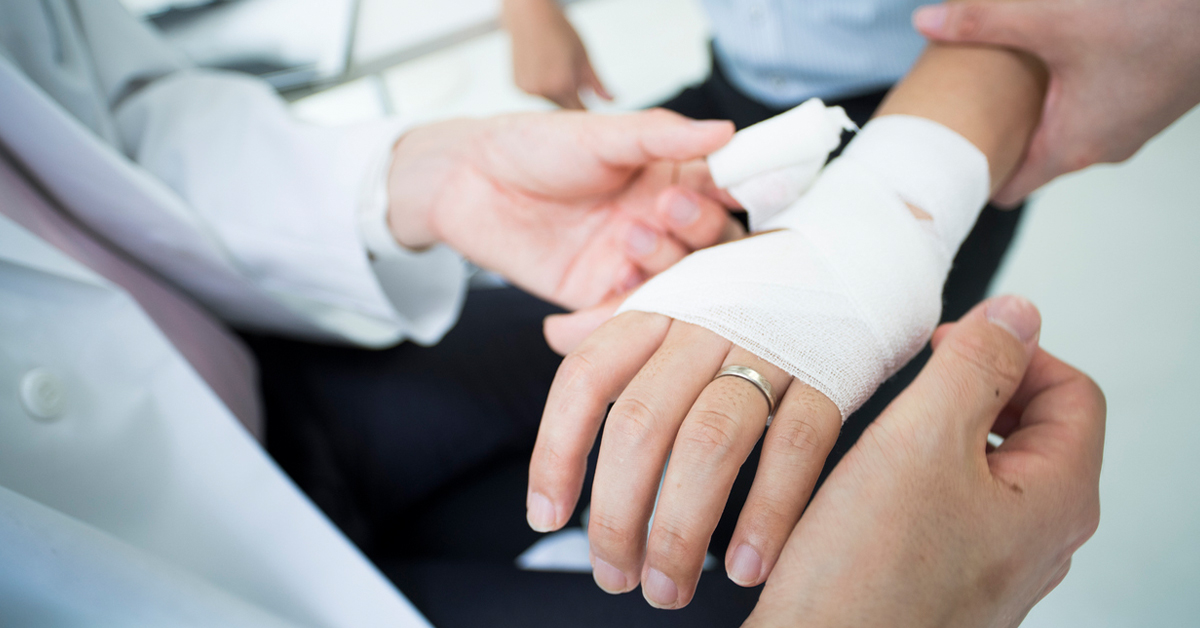Everyone will experience an open wound at some point in their life. An open wound is simply an injury involving an external or internal break in body tissue, usually involving the skin. Some common wound types are diabetic foot ulcers, venous insufficiency wounds, traumatic wounds, post-surgical wounds, and pressure ulcers.
While most minor wounds can be treated at home, medical care may be needed if the wound is more serious or if you have certain risk factors that may delay healing. Let’s discuss the importance of proper wound care, when you should seek medical care, and how to ensure your wound heals quickly.
The importance of proper wound care
When it comes to open wounds, the most common risk is infection. An infection occurs when germs, such as bacteria, grow within the damaged skin of a wound. When a wound becomes infected, it can get worse instead of better. Here are a few common signs that a wound is infected:
- The skin around the wound is warm
- Yellow or green discharge is coming from the wound
- The wound is giving off an unpleasant odor
- Red streaks are on the skin around the wound
- Fever and chills
Proper wound care basics, such as cleaning and protecting the wound, can reduce the risk of infection. Remember, it is important to seek medical attention if you are experiencing any signs/symptoms of infection.
Wound Care Basics
If you have a minor wound, following these basic tips can help put you on the right path to healing:
- After the initial injury, or when you first discover the wound, make sure to wash your hands; this helps to prevent the spread of infection.
- If the wound is still bleeding, apply pressure for about 10 minutes or until it stops bleeding.
- Clean the wound and surrounding skin thoroughly with soap and water.
- Avoid using Alcohol or Hydrogen Peroxide to clean the wound, it can actually further damage the tissue and delay healing.
- Apply an antibacterial ointment to the wound and cover with a dressing.
- Always keep wounds covered. Wounds should not be left “open to air” and they actually need moisture to heal. Simply a bandaid will work in a lot of cases but ALWAYS keep it covered. This also helps prevent infection by keeping debris and bacteria out of the wound.
If you have risk factors such as diabetes, venous disease, arterial issues, neuropathy, or history of delayed healing, you may be at higher risk and should be followed by a wound care specialist. For serious or potentially infected wounds, you should seek medical care immediately.
Advanced wound care treatment at UAB Medical West
UAB Medical West offers advanced and individualized wound care treatment to ensure our patients’ wounds heal quickly. From diabetic ulcerations to traumatic wounds, our physicians have the knowledge, skills, and experience to treat almost any type of wound. In addition, our facility is equipped with the most advanced technology. Our treatment options include:
- Hyperbaric medicine: In hyperbaric oxygen therapy, patients breathe in pure oxygen in a pressurized room or tube. Then, the patient’s blood carries this oxygen throughout your body, which helps fight bacteria and stimulate the release of substances that promote healing. Hyperbaric Oxygen also stimulates the growth of blood vessels from pre-existing vessels (angiogenesis), which helps to carry oxygen and nutrients to the wound allowing it to heal at a faster rate.
- Cellular and Tissue Based Products: Cellular and/or tissue-based products (CTPs), help to decrease healing time by providing the proteins and growth factors needed to ultimately heal the damaged skin.
- Negative Pressure Wound Therapy: Also known as NPWT, negative pressure wound therapy is another tool we use to help wounds heal. During the treatment, a wound vacuum device removes air pressure around the wound, which helps it heal more quickly.
- Total Contact Casts: Total contact casting (TCC) is considered to be the ‘gold standard’ in the treatment of diabetic foot ulcers. TCC is a cast designed to take weight off of the foot by off-loading in patients with diabetic foot ulcers (DFUs). Reducing pressure on the wound by taking weight off the foot has proven to be very effective in DFU treatment.
- Compression Therapy: Compression therapy has been shown to significantly reduce healing times and can be used for a wide variety of conditions.
- Nutrition: It’s important to eat well in order to heal well. Patients may receive personalized recommendations to improve their wound healing from a Registered Dietitian. We also offer nutrition classes monthly in the Wound Care Center that is open for all of our patients to attend.
Our specially-trained wound care team, paired with these advanced treatment options, result in quick recovery times for our patients. Visit our wound care center and we can determine the treatment option that is right for you!
Visit UAB Medical West for advanced wound care treatment
Should we list the Advanced Wound Center’s number here and/or request speaking with their physician about a referral? Call tel:205-481-7000 to schedule an appointment for an evaluation with a UAB Medical West provider. We are here to serve the communities of Hoover, Bessemer, McCalla, and Vance, and more!
